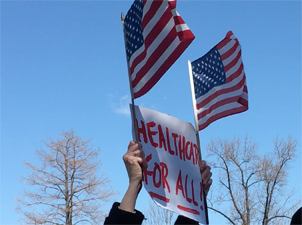
People of Faith Working for Access to Affordable Medicine
Fran Quigley
July 5, 2018
Last June, 26 year-old Alec Smith of Minnesota died because he could not afford to treat his Type 1 diabetes with insulin that has risen in price over 1,000% since the late 1990s. One out of every five Americans does not fill a prescription each year because they can’t afford it—and risk strokes, heart attacks and unrelenting pain as a result.
Tobeka Daki of South Africa, the mother of two sons, died in 2016 because she could not afford a monopoly-protected cancer medicine priced at 193 times its manufacturing cost. The United Nations estimates that 10 million people each year die because they cannot afford the medicine to treat them.
The tragic stories of Alec Smith and Tobeka Daki could be repeated many times over in every community, and they could be told about vaccines, mental health medicines, asthma medication and nearly every other treatment. Many of us heard about the Epi-Pen 450% price increases or “Pharma Bro” Martin Shkreli’s 5,000% overnight spike in the price of the HIV medicine Daraprim. But these high-profile controversies are only the most visible symptoms of a deeply entrenched problem.
In stark contrast to Jesus bringing healing to the poorest of the poor, today’s lifesaving treatments have increasingly become a luxury that only the world’s wealthy can afford. Protected from market competition by monopoly patents, medicines are routinely priced at levels hundreds of times their manufacturing costs. The companies that sell the medicines make record-breaking profits yet still routinely raise prices by double-digit margins each year.
These companies tout their research investments, but they actually spend far more on advertising, executive salaries as high as $78 million per year, stock buybacks that enrich the top shareholders, and political campaign donations. In the meantime, our sisters and brothers are splitting their pills, maxing out credit cards just to go to the pharmacy, or simply going without their medication.
For people of faith, this status quo is unacceptable. All major religious and moral traditions embrace a clear responsibility to care for those who are poor and the sick. And that obligation goes beyond direct care to use our voices to ensure that our systems and laws do not lock out those in desperate need of medicines.
So it is not surprising that a significant majority of Americans are demanding drug pricing reform. And we have an opportunity to make it happen. Bipartisan proposals to change the system are pending in dozens of states and Congress.
Those proposals include allowing Medicare to negotiate drug prices the same way other countries do now, and speeding the process for drugs to be available at far cheaper generic prices. The corporations setting record prices can do so only because our government has chosen to grant them private monopolies on selling taxpayer-funded developed medicines, even though nonprofit models for research and development have proven to be effective.
Advocates for affordable medicines have won before. In the HIV/AIDS treatment campaign of the turn of the century, much of the faith community joined a global moral movement that successfully overcame monopolies and reduced antiretroviral medicine prices by more than 90%, saving millions of lives in the process.
The faith community can play this role again. We start with the foundation, set out in both our sacred texts and global human rights treaties, that people who are suffering should be able to access the medicines they need. The fact that Alec Smith, Tobeka Daki and millions of others cannot access the medicine they need to live is a moral failing.
But we can fix this, and people of faith can help lead the way.
Fran Quigley is a NETWORK advocate based in Indiana and the coordinator of People of Faith for Access to Medicines (PFAM).
To the NETWORK Community:
Do you have a personal story about drug prices that you’d like to share with NETWORK as we advocate for affordable medicine? Submit your story below. Thank you!







